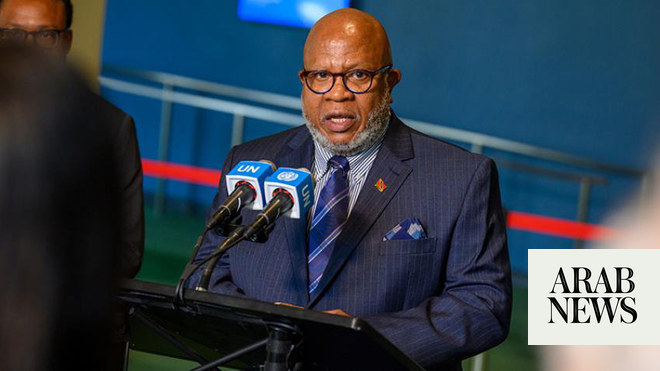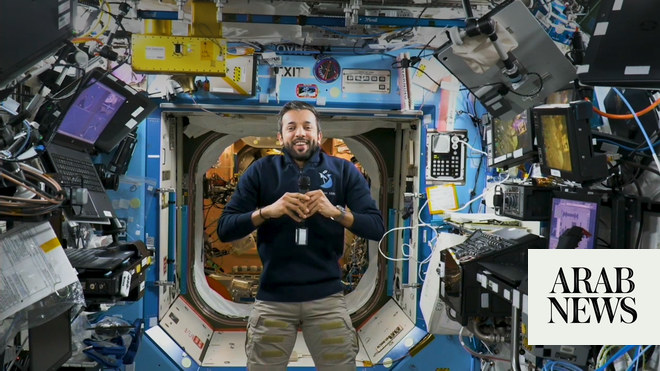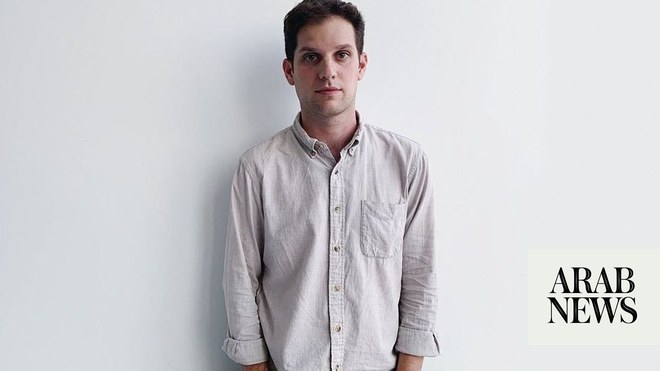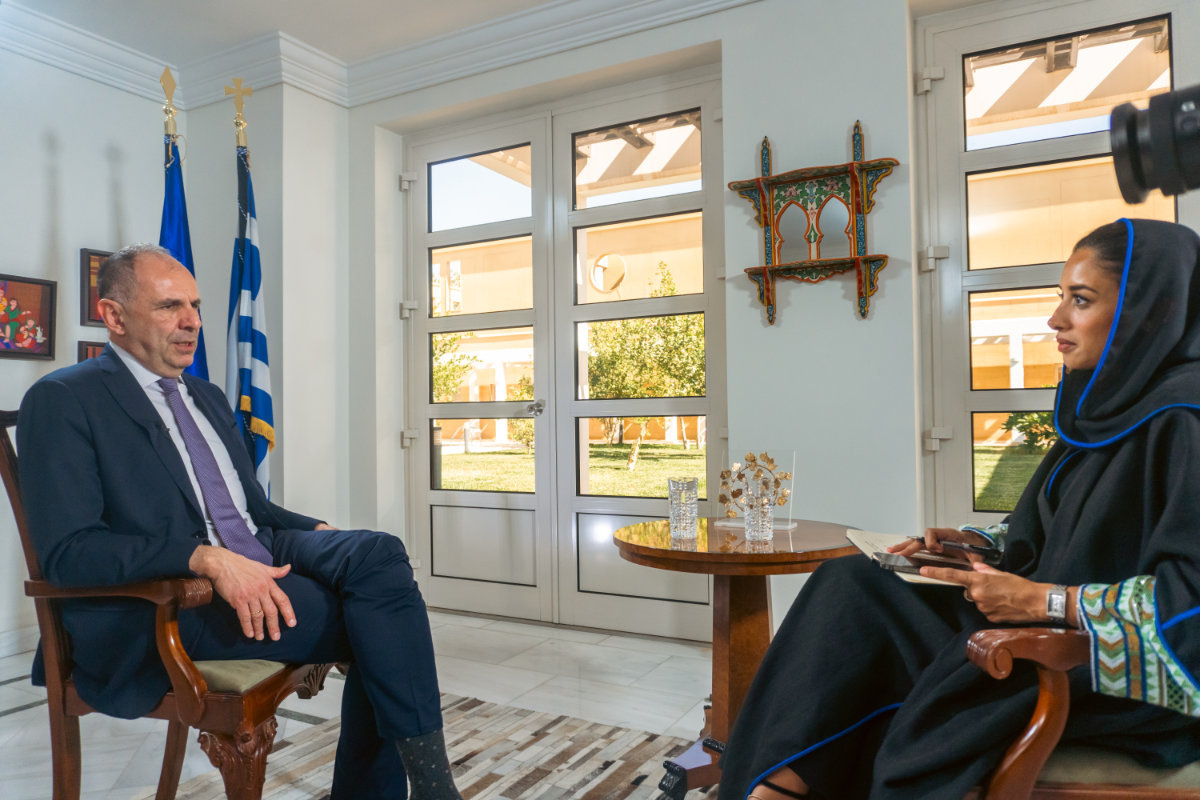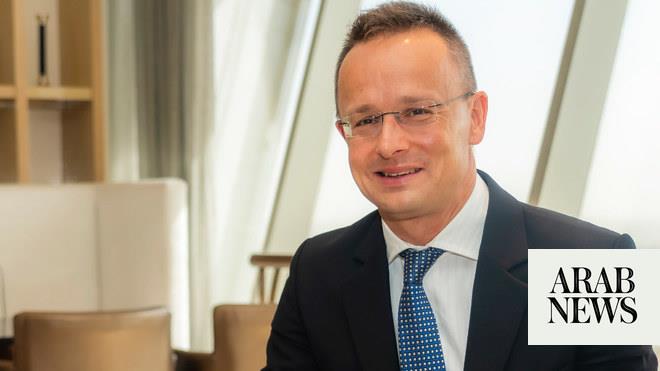
RIYADH: Peter Szijjarto, Hungary’s minister of foreign affairs and trade, has criticized EU sanctions targeting Russia over the war in Ukraine, claiming they have damaged European economies while failing to end the conflict.
Speaking to Arab News on the sidelines of the Ministerial Meeting of the Global Coalition to Defeat ISIS, held in Riyadh on Thursday, Szijjarto hit out at European critics who accuse Budapest of failing to boycott Russian energy.
“Energy supply is a physical issue, not a political issue,” he said. “It’s impossible to heat or cool down the houses and the flats with ideologies or with political statements.”
Citing Hungary’s geographical proximity to Russia and the current pipelines available to European nations, Szijjarto said his country had little option but to continue sourcing oil and gas from Russia to meet its demands.
“If you look at the infrastructure map of central Europe, when it comes to energy, you will see that because of the physical nature of the infrastructure, Russia is inevitable for us and is extremely important for us, from the perspective of a safe supply of energy,” he said.
“If we cut the Russian resources, then the remaining infrastructure does not have enough capacity to supply us with enough gas and oil.
“So my question, always, to these European colleagues, who are super hypocritical and are (leveling) allegations (against) us, (is) whether they would replace the Russian deliveries with gas and oil, even putting into consideration the lack of infrastructure. If there is no pipeline, how on earth will they deliver gas or oil to us?”
The war in Ukraine has put immense strain on Eastern European nations, which opened their doors to millions of Ukrainian refugees after Russia launched its full-scale invasion in February last year.
Another impact of the conflict and the Western sanctions that followed was a sharp rise in the price of energy, food and other commodities — inflationary pressures that have been keenly felt across Europe.
“These sanctions make no sense,” Szijjarto said. “They are much more harmful to the European countries than to Russia itself. They have been introduced with the goal of pushing Russia to its knees, economically speaking, thus making Russia unable to continue the war.
“That was a year ago. What happens now? We are now discussing the 11th package of sanctions, while the first 10 packages have failed, totally failed.
“Russia, definitely they are facing some economic challenges, but I’m pretty sure that we Europeans are faced with more serious economic challenges than them. And, on the other hand, we are not closer to peace either.”
Szijjarto welcomed Saudi offers of mediation between Russia and Ukraine, saying the conflict could be ended only through diplomatic means. He also lauded the Kingdom’s efforts to stabilize world energy prices.
“For us, the most important goal regarding the war in Ukraine is to create peace as soon as possible. It’s very obvious that this war does not have a solution on the battleground. This war only has a solution at the negotiating table,” he said.
“Diplomacy must take over, because if diplomacy cannot take over, then the war will last longer. The longer the war lasts, the more people will die. And we don’t want that. We want peace as soon as possible.
“Therefore, we absolutely appreciate the mediating efforts and the stabilizing role played, for example, by Saudi Arabia, because stability, forecastability in this regard, are reliable partners … (and) have a highly increased significance.
“We hope that mediation efforts put forward, for example, by the Saudi authorities, will be successful in the future and we ask you to continue to do so. The more mediation efforts there are, the more peace plans are being brought forward, the bigger the chance that peace will come.”
The ministerial meeting, for which Szijjarto was in Riyadh, attracted the top diplomats of several countries, including US Secretary of State Antony Blinken.
Daesh, as ISIS is also known, seized vast swathes of territory in Iraq and Syria in 2014 before the coalition was able to finally dislodge its fighters from their final holdouts in 2019.
The group’s members and sympathizers were also responsible for several mass casualty attacks in Europe and elsewhere, prompting governments to overhaul their security policies and revamp screening protocols for migrants and refugees.
But analysts are now concerned the world’s focus on the war in Ukraine risks diverting attention away from the ongoing threat posed by Islamic extremism.
“Hungary is pretty concerned about the growing threat of terror, because this threat usually causes additional flows, (such as) massive migration to Europe. Such flows constitute a pretty serious risk (to) security as well,” Szijjarto said.
“Since we in Europe are now faced with the challenge posed by the war in Ukraine, another type of security challenge would be unmanageable for us. Therefore, it is of crucial importance for us Europeans that the threat of terror is decreased. And without defeating ISIS, without pushing back ISIS, it’s impossible to (reduce) the threat of terror.”
Szijjarto said he appreciated the Kingdom’s efforts to keep the issue of terrorism at the top of the international agenda and cautioned against complacency.
“We appreciate the role of Saudi Arabia a lot when it comes to the fight against terror, when it comes to the fight against ISIS. And we are really thankful to the Saudi Arabian authorities for organizing the meeting of the anti-ISIS coalition, because we do believe that the efforts of this coalition should now be reinforced on many occasions.
“Whenever ISIS is getting stronger, the flows of migration are getting stronger. And whenever there are more people involved in the flows of migration, the more terrorists are having the chance to come to Europe. An increased threat of terror here usually ends up in an increased threat of terror in Europe.”
In January 2020, Szijjarto said Hungarian companies were well positioned to play a role in Vision 2030 — the Kingdom’s economic diversification and social reform agenda — particularly in the areas of agriculture, housing and electronics.
Asked about progress in the Saudi-Hungary relationship since then, the minister said the decks had been cleared for an expansion of trade and investment.
“The technologies that Hungarian companies and universities and research institutions have basically worked on are very useful from the perspective of the development of the Saudi economy as well,” he said.
“You have made huge efforts here in Saudi Arabia to upgrade infrastructure, but for future development, Hungarian companies are at our disposal as well.
“Saudi Arabia and Hungary enjoy trust-based, respect-based political cooperation without any kind of open issues. Therefore, it’s up to the companies to find a way to each other.
“So, what the two governments can do is pave the way to ensure the necessary legal and financial circumstances and insurances, which we have done. So it’s now up to the companies to take the most possible profit out of this good political cooperation.”
Also high on the international agenda is the crisis in Sudan, where the military and a paramilitary group have been locked in combat since April 15. The conflict has displaced more than 1 million people and triggered a humanitarian emergency.
Saudi Arabia and its US allies have taken the lead in mediation efforts, hosting representatives from both parties for ceasefire talks in the Kingdom’s coastal city of Jeddah.
Szijjarto said a solution had to be found quickly to avoid a fresh wave of migration to Europe, adding that the EU had a role to play in supporting Sudan’s neighbors, which are now home to hundreds of thousands of displaced people.
“We understand that the countries in the neighborhood are now faced with a tremendous challenge posed by the huge number of refugees,” Szijjarto said.
“Therefore, we urge the EU to transfer an increased volume of financial support and assistance to these countries in the neighborhood in order to be able to take care of the refugees, not to lose stability, not to bear too much burden, financially speaking, and not to come to a situation in which the neighboring countries become kind of transit countries. And then the flow of refugees will transform into a flow of migrants. And (after that), it would be a totally irregular set of developments.”
Under the circumstances, he said, “we are interested in stability as soon as possible, we are interested in the people who had to flee to be able to return as soon as possible and for the whole neighborhood to become more stable.”





